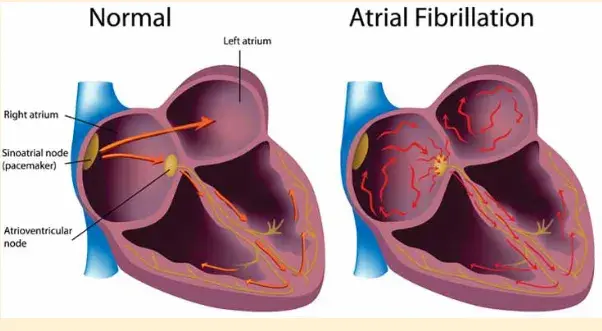What is Atrial Fib?
It’s imperative for you to understand what Atrial Fibrillation (AFib) is, as it can significantly impact your heart’s health. AFib is a common type of irregular heartbeat that can lead to serious complications, including strokes and heart failure. Awareness of your symptoms, such as palpitations or fatigue, can help you seek timely medical intervention. Although AFib can pose risks, effective management strategies are available to help you live a healthier life. This post will guide you through the basics of AFib, its causes, symptoms, and treatment options.
Key Takeaways:
- Atrial Fibrillation (AFib) is a common heart rhythm disorder that increases the risk of stroke and heart complications.
- Symptoms of AFib may include palpitations, shortness of breath, and fatigue, but some individuals may feel no symptoms at all.
- Management of AFib often involves medications, lifestyle changes, and sometimes procedures like cardioversion or ablation to restore normal heart rhythm.
Understanding Atrial Fibrillation
For many, understanding atrial fibrillation, or AFib, is crucial, as it significantly impacts heart health. This irregular heart rhythm can lead to various complications, including stroke and heart failure. By educating yourself about the nature and implications of AFib, you empower yourself to seek the right treatment and lifestyle adjustments for a healthier future.
Definition and Overview
Behind the complexity of the heart’s electrical signals lies atrial fibrillation, a condition characterized by an irregular and often rapid heartbeat. AFib occurs when the heart’s upper chambers, or atria, experience chaotic electrical signals, leading to inefficient blood flow. This condition can manifest as palpitations, shortness of breath, or fatigue, impacting your overall well-being.
Types of Atrial Fibrillation
Against the backdrop of atrial fibrillation, there are different types that you need to recognize, as each has unique characteristics and implications for treatment. The main types include:
| Type | Description |
| Paroxysmal | Intermittent AFib that comes and goes. |
| Persistent | Continuous AFib lasting more than a week. |
| Long-standing Persistent | AFib that lasts over a year. |
| Permanent | AFib where treatments are no longer effective. |
With these classifications, you can better understand your situation or that of a loved one. Here are key aspects to consider:
- Paroxysmal: Episodes typically resolve within 48 hours.
- Persistent: Requires medical intervention to convert to normal rhythm.
- Long-standing Persistent: Management strategies may involve ongoing treatments.
- Permanent: Continuous AFib leads to a need for long-term management.
- Any type of AFib necessitates an evaluation for heart health.
Understanding these types can guide your treatment options and lifestyle modifications, leading to better health outcomes. Knowing your type of AFib is crucial for optimizing your care plan and minimizing risks associated with the condition.
Symptoms and Diagnosis
There’s a range of symptoms associated with atrial fibrillation (AFib), which can vary in severity and frequency. Many people experience a fluttering or pounding sensation in the chest, often accompanied by feelings of dizziness, shortness of breath, and fatigue. Understanding these symptoms is vital for early intervention and effective management of your heart health.
Common Symptoms
At times, you may notice your heart racing or irregular heartbeat, which can cause unexpected episodes of weakness or lightheadedness. Some individuals also report chest discomfort or pain, and these sensations can lead to anxiety. Paying attention to these common symptoms can help you seek medical advice promptly.
Diagnostic Procedures
Around your doctor’s office, several diagnostic procedures can help determine whether you have AFib. These may include an electrocardiogram (ECG) to measure your heart’s electrical activity or a Holter monitor that tracks your heart rhythm over multiple days. You may also undergo echocardiograms that visualize your heart structure.
Even further, your healthcare provider may recommend additional tests for a comprehensive assessment. These can include exercise stress tests to evaluate your heart’s performance during physical activity, or blood tests to check for conditions that could contribute to AFib. Identifying the presence of AFib early can help you get the appropriate treatment, minimizing your risk for serious complications like stroke or heart failure. Your proactive approach to understanding these diagnostic procedures can enhance your healthcare journey.
Causes and Risk Factors
Your understanding of the causes and risk factors associated with Atrial Fibrillation (AF) is crucial for prevention and management. These factors can include:
- High blood pressure
- Heart disease
- Diabetes
- Obesity
- Excessive alcohol consumption
- Family history
Any of these elements can significantly increase your likelihood of developing AF.
Primary Causes
Against common belief, Atrial Fibrillation is often not a standalone condition; instead, it typically arises due to existing health issues. Heart valve problems, coronary artery disease, or even thyroid disorders can contribute to its onset, making it vital to address these underlying issues.
Influential Risk Factors
One should be aware of various influential risk factors linked to Atrial Fibrillation. These can include:
- Age
- Caffeine intake
- Stress
- Lung diseases
- Sleep apnea
The presence of these factors can make a meaningful difference in your heart health.
It’s important to prioritize your heart health by managing your lifestyle choices and being aware of your medical history. Conditions like sleep apnea can cause your heart to work harder, while high-stress levels can trigger AF. Furthermore, age is a significant risk factor, with older adults being more susceptible. Focus on a balanced diet and regular exercise to mitigate these risks. The more proactive you are regarding your health, the better your chances of preventing Atrial Fibrillation.
Treatment Options
Unlike other conditions, treating atrial fibrillation often involves a combination of lifestyle changes, medications, and sometimes procedures to restore a normal heart rhythm. Your doctor will evaluate your specific situation to determine the best course of action, which may include monitoring your heart rhythm, managing symptoms, and reducing the risk of stroke.
Lifestyle Changes
Across the spectrum of treatment options, implementing lifestyle changes can significantly impact your overall heart health. This can include maintaining a healthy diet, engaging in regular physical activity, avoiding excessive alcohol consumption, and managing stress. Prioritizing these modifications helps create a solid foundation for managing your atrial fibrillation effectively.
Medications and Procedures
Changes in your treatment regimen may involve medications such as blood thinners, beta-blockers, or antiarrhythmic drugs. These aim to control your heart rate, minimize symptoms, and reduce stroke risk. If medications are insufficient, your doctor may recommend procedures like cardioversion or catheter ablation. Cardioversion involves delivering an electric shock to reset your heart’s rhythm, while ablation targets the problematic areas in your heart tissue to prevent irregular electrical signals. It’s important to consult with your healthcare provider to find the most effective treatment tailored to your needs.
Complications and Prognosis
Despite being manageable, atrial fibrillation (AF) can lead to serious health complications if left untreated. You may face risks of heart disease, stroke, and other cardiovascular issues. Understanding these risks can empower you to work with your healthcare provider for effective management and treatment to reduce potential dangers associated with this condition.
Potential Complications
With atrial fibrillation, you are at a higher risk for several complications, particularly stroke. The irregular heartbeat can lead to blood clots forming in the heart, which may dislodge and travel to your brain. Other complications include heart failure and increased risk of other serious heart conditions, which underscores the importance of proper management.
Long-term Outlook
Among individuals with atrial fibrillation, outcomes vary based on several factors including age, overall health, and adherence to treatment plans. While some may live a normal life expectancy with appropriate management, others might experience complications that significantly affect quality of life.
Due to the nature of atrial fibrillation, your long-term outlook heavily depends on how well you manage the condition and your existing health issues. By following your doctor’s recommendations and maintaining a healthy lifestyle, you can improve your overall prognosis. Early detection and treatment are vital in minimizing risks for serious complications. Take an active role in your health by monitoring your symptoms and keeping regular appointments, which can lead to a better quality of life even with AF.
Prevention and Management Strategies
Now that you understand what Atrial Fibrillation (AF) is, you may be wondering about effective ways to prevent and manage this condition. Implementing a combination of lifestyle changes and medical interventions can significantly reduce your risk and improve your overall heart health.
Preventative Measures
Before tackling AF, consider adopting a heart-healthy lifestyle. Focus on maintaining a balanced diet rich in fruits, vegetables, whole grains, and lean proteins, along with regular physical activity. Quitting smoking and moderating alcohol intake can also mitigate your risk of developing this condition.
Ongoing Management
One of the keys to managing AF is regular monitoring and follow-up with your healthcare provider. This includes medication adherence, lifestyle modifications, and routine check-ups to assess your heart health.
To effectively manage your condition, you should engage in a personalized treatment plan that might include medications to control your heart rate and rhythm, as well as to prevent blood clots. Additionally, incorporating stress reduction techniques, such as meditation and yoga, can benefit your heart health. Staying informed about your symptoms and potential triggers will empower you in your management journey. Don’t hesitate to reach out for support from healthcare professionals; they play a vital role in ensuring you maintain a good quality of life despite AF.
Final Words
The knowledge you gain about atrial fibrillation empowers you to recognize its symptoms and understand its potential effects on your health. This common heart condition can lead to serious complications if left untreated, but with the right information and medical guidance, you can manage your risk effectively. Your awareness of atrial fibrillation allows you to seek timely care and make informed lifestyle choices that promote heart health, helping you maintain a better quality of life.



